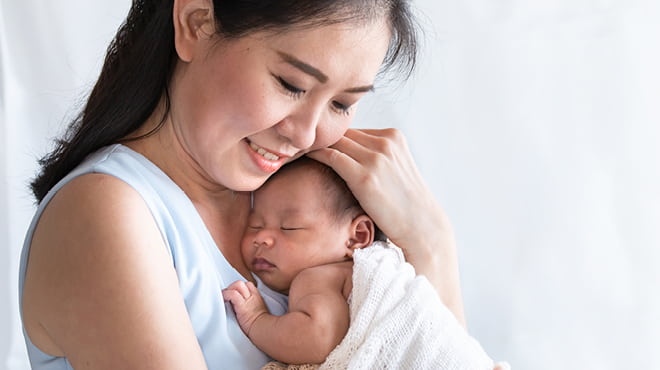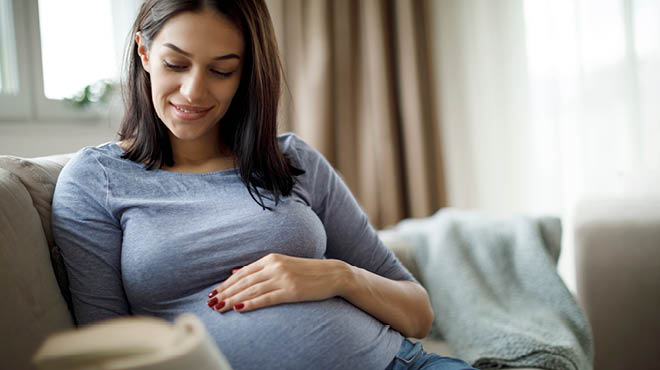Recent Posts
COVID-19 and pregnancy: Q&A

It's often said that pregnant women are eating for two. But during this COVID-19 pandemic, they also may be worrying for two. This time can feel especially frightening for some pregnant women who are considering the safety of their newborns.
This Q&A can help expecting families feel informed and prepared for pregnancy and delivery during this uncertain time:
Q. Are pregnant women at a great risk of getting COVID-19?
A. COVID-19 is a newer viral infection, which means there is limited data about its effects on pregnant women who become infected. At this point, pregnant women seem to have the same level of infection risk as women who are not pregnant.
Q. Is COVID-19 more dangerous for pregnant women?
A. According to the Centers for Disease Control and Prevention, pregnant women are at an increased risk for severe illness from COVID-19 and death, compared to nonpregnant women. Also, pregnant women with COVID-19 may have an increased risk for other adverse outcomes, such as preterm labor.
Q. What can pregnant women do to reduce their risk of getting COVID-19?
A. The best way to reduce the risk of infection is the same for all people. Prevent the virus from infecting your body by washing your hands frequently with soap and water or alcohol-based hand sanitizer, and disinfect surfaces in your house that are frequently touched, such as countertops and doorknobs. Also, you should maintain physical distancing, stay home if possible and wear a mask.
Q. If a woman gets COVID-19 while pregnant, will it harm her baby?
A. At this time, current evidence suggests that transmitting the virus from mother to baby during pregnancy is unlikely. COVID-19 has not yet been found in breast milk, amniotic fluid or other maternal body fluid samples. However, while the virus may not transfer to baby, a mother's infection can affect her baby. Any severe infection that compromises a mother's ability to breathe can significantly affect the baby, as the baby relies on the oxygen in a mother's blood. Severe illness in pregnant women can increase the risk of preterm birth, either due to preterm labor, or the medical need to deliver early for the health of the mother or baby. Pregnant women who become ill with symptoms consistent with COVID-19 should call their health care providers.
Q. With social gatherings being canceled, what should pregnant women do about attending a childbirth education class?
A. Childbirth education is an important part of preparing for birth. However, in-person classes are not available at this time due to physical distancing. The best option is to pursue online options that can help women prepare for birth while minimizing their risk of becoming sick with COVID-19. While women are encouraged to take birthing classes, they are optional. Many women who have not attended birthing classes have still had successful vaginal births. Finally, women will still have prenatal appointments with their providers. If they have specific questions, they should speak up, and ask their nurse or provider.
Q. Are there any other care options during COVID-19?
A. Mayo Clinic Health System offers more virtual care options so patients do not need to come in to receive routine prenatal care. Virtual care options allow women to maintain social distancing, which helps minimize risk of exposure. Ultrasounds will be scheduled as needed. Locations in Eau Claire, La Crosse, Mankato and Menomonie also offer the Mayo Clinic OB Nest program. This program, which was in place before the COVID-19 pandemic, allows women to have fewer in-person visits. Through this innovative program, women are provided a fetal Doppler — the instrument used to listen to baby's heartbeat, and a blood pressure cuff. Women can use these tools to monitor their own health and the well-being of their babies. Nurses provide care via phone calls and online through Patient Online Services.
Q. Is the birth experience different during this pandemic?
A. Yes, the experience is a bit different right now. While there are a few small differences, women do not need to bring anything special to the hospital or prepare differently. At this time, women can have one support person join them during labor and delivery. In the past, women were allowed multiple visitors. However, limiting visitors to a single support person helps to limit the risk of spreading COVID-19 in the Birth Center. Due to visitor limitations, women should plan to use social media or other methods of virtual communication to introduce newborns to their family and friends. You and your support person will be required to wear a mask while in the hospital. It is important to note that women who are ill with COVID-19 will not be able to have a support person during labor due to the increased risk of spreading the virus.
Q. Is the COVID-19 vaccine safe for pregnant and breastfeeding women?
A. On Dec. 12, 2020, the Pfizer BioNTech vaccine received emergency use authorization from the Food and Drug Administration, including authorization to vaccinate pregnant and breastfeeding women. The U.S. Advisory Committee on Immunization Practices recommends with the Pfizer BioNTech vaccine that these patients discuss vaccination with their health care providers. They should discuss the benefits and risks, and consider what is known and what is not known to make an informed decision with the expectation that many would proceed with vaccination.
Laura Ambler, D.O., is an OB-GYN in Eau Claire, Wisconsin.
This post was updated on Feb. 12, 2021, to reflect new recommendations. The information is accurate at the time of its posting. Due to the fluid nature of the COVID-19 pandemic, scientific understanding, along with guidelines and recommendations, may have changed since the original publication date in April 2020.




